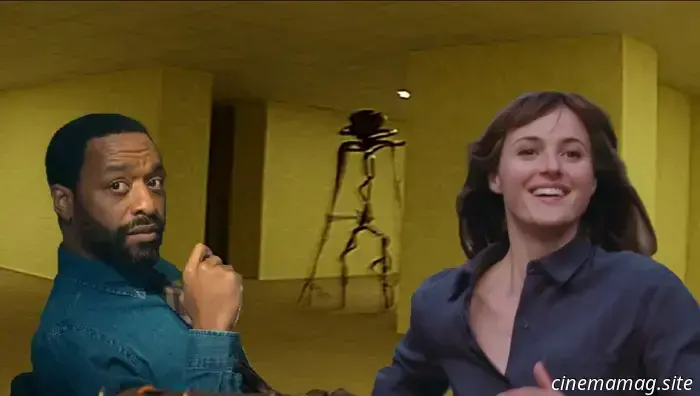
Tribeca Review: Holding Liat Portrays One Family's Narrative Through a Mosaic of Political Perspectives
The initial words we hear in Brandon Kramer’s Holding Liat are delivered over the phone by someone identified in the subtitles as the “Israeli Army liaison.” During this brief conversation, a male voice informs a distressed man in his seventies that his daughter, Liat, has been “abducted by terrorists and is being held in the Gaza Strip,” but is alive. Right from the beginning, Holding Liat appears to be a film designed to evoke strong emotions, appealing to the viewer's compassion with the story of a family whose daughter and son-in-law were taken hostage on October 7, 2023. Knowing that Brandon Kramer and his brother Lance (who both directed the 2021 documentary The First Step featuring Van Jones) decided to create a film about how their relatives in Israel—Yehuda and Chaya Atzili, Liat’s parents—handle this unimaginable ordeal raises questions about whether it may reflect emotionally tinted pro-Israel propaganda.
However, such an interpretation this early in the film would be harsh, even if it's based on the kind of justified skepticism one should have regarding contemporary political documentaries. Holding Liat quickly unfolds into a much more intricate narrative: a blend of personal beliefs, political stances, and perspectives from the Israeli-American Beinin family. Chaya, Liat’s mother, expresses her concerns but refrains from voicing her opinions; Tal, Liat’s younger sister, maintains a moderate stance; while twenty-something Netta, one of Liat’s children, openly expresses animosity towards Hamas for kidnapping her parents. Conversely, Joel Beinin, Liat’s uncle and a professor emeritus at Stanford, courageously supports Palestine and critiques the IDF. Yehuda, Liat's father and a central figure in the film, unexpectedly reflects the same propagandistic skepticism I initially brought to the viewing.
Kramer captures the Beinin family both as a collective—documenting their interactions, shared sorrow, and heated disputes—and as individuals. The camera is keenly present, reflecting the urgency of the circumstances and the imperative to document them. Perhaps the film’s most poignant moments highlight the political tensions at a personal level, particularly as Chaya or Tal chastise Yehuda for seeking more than just Liat’s return. He also comments on the wrongdoings of Benjamin Netanyahu, even confronting the distorted views held by some Zionists. At one point, Yehuda attends a “Save the Hostages” rally that swiftly turns into a Zionist demonstration; he is shocked, protests, and leaves.
Yet, the film does not portray Yehuda as a political measure or an archetype. By including various interactions with Congress and President Biden, Holding Liat seeks to illustrate a deeper understanding and solidarity between Israeli citizens and Palestinian advocates. The U.S. involvement is also analyzed—its subjects acknowledge that Liat’s American citizenship enhances their influence and ability to apply pressure, while they risk becoming entangled in yet another American myth of valor. If it would be too ambitious for this film to attempt to resolve an issue or bridge a divide as vast as the one currently challenging our world, it might be more fitting that Holding Liat remains in the uncertain space of waiting: for the hostages to be freed, for a death to be confirmed. In the director’s statement, Kramer aligns his work “alongside” contemporary Israeli and Palestinian films, a responsible approach that differentiates micro-level from macro-level politics. Still, the film premiered at Tribeca just days after the humanitarian aid boat from the Freedom Flotilla was seized by Israeli forces––making it impossible to perceive Holding Liat as a historical document detached from the ongoing political landscape.
Holding Liat was showcased at the 2025 Tribeca Festival.
Other articles
 The Carrie TV series has cast Katee Sackhoff, Heather Graham, Kate Siegel, Michael Trucco, among others.
Following the announcement of the main cast for Mike Flanagan’s television adaptation of Stephen King’s Carrie last week, the Amazon MGM series has now completed its lineup of supporting actors. According to Deadline, the series will feature Kate Siegel (The Fall of the House of Usher), Michael Trucco (Midnight Mass), Katee Sackhoff (The Mandalorian), Heather Graham (Gunslingers), and Rahul Kohli (The Life …).
The Carrie TV series has cast Katee Sackhoff, Heather Graham, Kate Siegel, Michael Trucco, among others.
Following the announcement of the main cast for Mike Flanagan’s television adaptation of Stephen King’s Carrie last week, the Amazon MGM series has now completed its lineup of supporting actors. According to Deadline, the series will feature Kate Siegel (The Fall of the House of Usher), Michael Trucco (Midnight Mass), Katee Sackhoff (The Mandalorian), Heather Graham (Gunslingers), and Rahul Kohli (The Life …).
 Renate Reinsve and Chiwetel Ejiofor join The Backrooms for A24's adaptation of the viral horror sensation.
A24 has successfully secured an impressive leading pair for their adaptation of the web series The Backrooms, as it has been announced that Renate Reinsve, known for The Worst Person in the World, will be joining Chiwetel Ejiofor in the horror film. According to Deadline's report, the stars of The Life of Chuck and A Different Man have been cast in the […]
Renate Reinsve and Chiwetel Ejiofor join The Backrooms for A24's adaptation of the viral horror sensation.
A24 has successfully secured an impressive leading pair for their adaptation of the web series The Backrooms, as it has been announced that Renate Reinsve, known for The Worst Person in the World, will be joining Chiwetel Ejiofor in the horror film. According to Deadline's report, the stars of The Life of Chuck and A Different Man have been cast in the […]
 Our Top 7 Christmas Movies That Are Not Typically Recognized as Such - MovieMaker Magazine
These disguised Christmas films will provide entertainment whether you're in the mood for a holiday movie or are weary of the usual Christmas fare.
Our Top 7 Christmas Movies That Are Not Typically Recognized as Such - MovieMaker Magazine
These disguised Christmas films will provide entertainment whether you're in the mood for a holiday movie or are weary of the usual Christmas fare.
 The trailer for Brute 1976 hints at a bloody tribute to classic slasher films.
Cinephobia Releasing has unveiled a poster and trailer for the 70s-set slasher film Brute 1976, directed by Marcel Walz. A tribute to cult classics such as The Texas Chain Saw Massacre and The Hills Have Eyes, the movie focuses on a group of individuals who come across what they think is a deserted town in the desert, oblivious to the fact that…
The trailer for Brute 1976 hints at a bloody tribute to classic slasher films.
Cinephobia Releasing has unveiled a poster and trailer for the 70s-set slasher film Brute 1976, directed by Marcel Walz. A tribute to cult classics such as The Texas Chain Saw Massacre and The Hills Have Eyes, the movie focuses on a group of individuals who come across what they think is a deserted town in the desert, oblivious to the fact that…
-Movie-Review.jpg) The Unholy Trinity (2025) - Film Review
The Unholy Trinity, set for release in 2025. Directed by Richard Gray, the film features performances by Pierce Brosnan, Samuel L. Jackson, Brandon Lessard, Veronica Ferres, Gianni Capaldi, Q’orianka Kilcher, Tim Daly, Ethan Peck, Katrina Bowden, David Arquette, Anthony J. Sharpe, Beau Linnell, Isabella Ruby, Eadie Gray, Stephanie Hernandez, Dylan Brosnan, Paris Brosnan, Stu Brumbaugh, Tina Buckingham, Nick Farnell, Chuck Mathews, Scott McCauley, […]
The Unholy Trinity (2025) - Film Review
The Unholy Trinity, set for release in 2025. Directed by Richard Gray, the film features performances by Pierce Brosnan, Samuel L. Jackson, Brandon Lessard, Veronica Ferres, Gianni Capaldi, Q’orianka Kilcher, Tim Daly, Ethan Peck, Katrina Bowden, David Arquette, Anthony J. Sharpe, Beau Linnell, Isabella Ruby, Eadie Gray, Stephanie Hernandez, Dylan Brosnan, Paris Brosnan, Stu Brumbaugh, Tina Buckingham, Nick Farnell, Chuck Mathews, Scott McCauley, […]
 Carnival Films CEO Gareth Neame on Delivering the Finest in 'Very British' Entertainment
Carnival Films has expanded internationally following its incredible success with Downton Abbey, as well as its sniper-thriller series The Day of the Jackal and air-disaster drama.
Carnival Films CEO Gareth Neame on Delivering the Finest in 'Very British' Entertainment
Carnival Films has expanded internationally following its incredible success with Downton Abbey, as well as its sniper-thriller series The Day of the Jackal and air-disaster drama.
Tribeca Review: Holding Liat Portrays One Family's Narrative Through a Mosaic of Political Perspectives
The opening lines of Brandon Kramer’s Holding Liat are delivered over the phone by an individual identified in the subtitles as the "Israeli Army liaison." During this brief conversation, the male voice informs a distressed man in his seventies that his daughter, Liat, has been "kidnapped by terrorists and is being held in the Gaza Strip," and that she is still alive.
